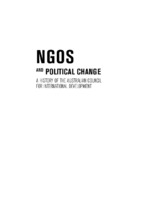NGOs and Political Change. A History of the Australian Council for International Development
Abstract
The Australian Council for International Development is the peak body of Australian international development NGOs. This book explores ACFID’s history since its founding in 1965, drawing on current and contemporary literature as well as extensive archival material. The trends and challenges in international development are seen through the lens of an NGO peak body: from the heady optimism of the first Development Decade of the 1960s, through the growth in government support of NGOs in the 1980s, to the challenges of the 2010s. The major themes of ACFID are presented: human rights; gender justice; humanitarianism; NGO codes of conduct; and influencing government policy both broadly and as it relates to NGOs. Each of these themes is placed in a global context and in relation to what other NGO networks are doing internationally.
Keywords
australia; history; non-government organisations; international development; Human rightsDOI
10.26530/OAPEN_578873ISBN
9781925022469OCN
945783024Publisher
ANU PressPublisher website
https://press.anu.edu.au/Publication date and place
2015Classification
Non-governmental organizations (NGOs)


 Download
Download Web Shop
Web Shop